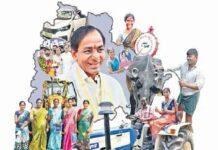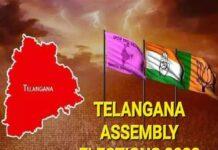Promotion of small farmer economy will help escape the six-decade-old crisis and boost the sector in State. Agriculture in Telangana, particularly being carried out by small and marginal farmers, is poised for a rapid transition in the coming years.
More so, after the historical announcement of a major policy on promotion of small farmer economy by Chief Minister K Chandrashekhar Rao at the recently-held plenary.
The first full-scale Budget of 2015-16 addressed the key issues of debt-waiving, low productivity, increasing input costs and stagnant public investments. Apart from substantial subsidies for farmers by way of direct transfers, the announcement by the Chief Minister sends a clear message towards organising the farming community to overcome issues pertaining to economies of scale.
This will enable agriculture in the State and the small farmer economy, in particular, to come out of the persistent crisis of the last six decades. The announcement addresses the major challenge of designing and implementing of a transition process that would ensure increasing yields and incomes, food and nutrition security while conserving and enhancing natural resources.
Why is this approach so crucial for small and marginal farmers, consumers as well as the community at large?
Firstly, as people depend crucially on natural resources, effective food security policies must be associated with sustainable management of land, soil, water, air, pollution, landscapes, biodiversity, forests. The focus also needs to be on adaptation and mitigation measures regarding climate change strategies, genetic and other natural resources.
The more natural resources will degrade, the less food will be available. Therefore, food and nutrition issues are strongly interrelated, thereby increasing the need for sustainable management of natural resources. This requires a comprehensive agricultural and food policy, in which complex and diverse nature-related institutions and governance structures can ensure achieving the twin objectives.
These efforts are reflected in the ongoing and proposed Mission Kakatiya, Haritha Haram, soil testing and documentation, irrigation management, organic fertilization, agricultural landscaping and biodiversity. Hence, planners, implementing agencies and researchers should explore the link between food, nutrition security and management of natural resources as well as the role of science, technology, education and extension in natural resource management and agriculture transformation. Sustainable management of these resources through collective action remains a major challenge.
Secondly, agriculture together with horticulture, animal husbandry, fisheries and agro-forestry, is the main source of income for the population, apart from being an engine for social equity and economic growth of the State. However, due to small holdings, fragmentation, low investment capacities, lack of access to technologies, credit and marketing institutions, the small farming economy is facing a serious crisis. So, it would be of utmost importance to find solutions to make it economically and socially viable.
The State’s approach to facilitating their organisation through their own Rythu Sanghalu to overcome economies of scale addresses this gap. The challenge, therefore, again is to design an ideal value chain approach and disseminate the knowledge to the farmers.
An ideal value chain should bring all the stakeholders engaged in the production system on a common platform to contribute their best while ensuring a fair deal and transparency. The value chain includes input suppliers, technology delivering agencies, scientists and extension officers who are involved in capacity building and providing various services. The stakeholders involved in post-production activities are the agencies organising collection, grading, storage, transportation, processing and marketing of the produce. Agencies like financial institutions and market information centres are also part of the value chain.
An efficient linkage of various stakeholders improves production, price realisation and profitability. For this, producers have to organise their agricultural production efficiently through producer organisations or cooperative enterprises. This can be any producer organisation, Producers Company (Company’s Act of 1956), Producers Cooperatives, registered Farmers Federations (Rythu Sanghalu) and Mutually Aided Cooperative Society (1995 Act).
Thirdly, food demand will be further affected by rapid urbanisation; increased per capita income; changes in lifestyles, food preferences and expansion of international trade. These will impact food production, quality, distribution, and consequently nutritional security and both urban and rural livelihoods.
Urban areas are growing, including by migration of the rural poor. Often the urban poor in towns and cities depend on public food provision programmes. In addition, human health in both types of societies majorly depends on food provision and quality.
Here, the steps announced by the Chief Minister concerning strict vigilance and enforcement of the new law on contamination of seeds as well as ensuring food quality gain importance.
It is well-known that farmers by and large never indulge in contamination or adulteration of produced food. Cooperatives or farmers associations, as economic operators, have been involved in global supply chains. The cooperative business model itself was born as a way to shorten supply chains, eliminate intermediaries either by aggregating producers (eg farmer-owned agricultural cooperatives) or consumers (eg consumer-owned food retail cooperatives).
The major difference between cooperatives and other business models in terms of supply chain intervention is that cooperatives integrate their values and principles into those supply chains, and not just to reap the economic benefits. It is, therefore, a challenge again to the planners, implementing agencies and researchers to explore the best value chain.
In the wake of a clear policy message, the challenge will be to organise research and develop appropriate implementation models, pilot ventures concerning agriculture, and environment and food policies to study these three policy areas in an integrated way. Forward-looking policies and measures to help individuals and organisations will be required to address the manifold demands of society. #KhabarLive







